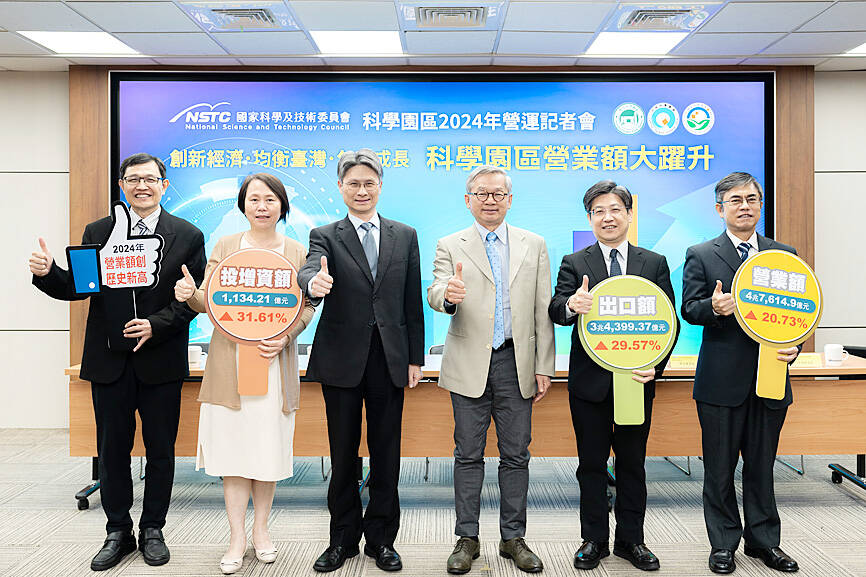The nation’s three major science parks posted record combined revenue of NT$4.76 trillion (US$144.41 billion) for last year, up 20.73 percent year-on-year, the National Science and Technology Council said in a report yesterday.
The council attributed the strong performance to rising demand for emerging technologies such as artificial intelligence (AI) and the end of inventory adjustments throughout the global semiconductor supply chain, the report said.
Combined revenue of firms at Hsinchu Science Park (新竹科學園區) increased 6.66 percent annually to NT$1.51 trillion, Central Taiwan Science Park (中部科學園區) posted revenue growth of 10.22 percent to NT$1.04 trillion and Southern Taiwan Science Park (南部科學園區) grew 39.55 percent to NT$2.21 trillion, the council said.

Photo courtesy of the National Science and Technology Council
Southern Taiwan Science Park’s revenue exceeded the NT$2 trillion mark for the first time, spurred by a higher sales contribution by semiconductor firms led by Taiwan Semiconductor Manufacturing Co (TSMC, 台積電), it said.
Regarding TSMC’s plans to construct 11 new production lines in Taiwan this year, the council is planning the second phase of expansion at Central Taiwan Science Park’s Taichung campus as a possible site for the chipmaker’s new investment at home, National Science and Technology Council Minister Wu Cheng-wen (吳誠文) told a news conference in Taipei.
“The government would continue to assist TSMC’s development in Taiwan” in terms of land, labor and utility, Wu said.
TSMC is expected to start mass production of chips using advanced node technologies at Hsinchu Science Park’s Baoshan (寶山) campus and Southern Taiwan Science Park’s Kaohsiung campus, while it plans to produce next-generation, cutting-edge 1.4-nanometer chips, he said.
Last year, the three science parks exported a combined NT$3.44 trillion of goods, up 29.57 percent from a year earlier, as the AI boom helped drive shipments of advanced chips and emerging-technology products, the report said.
At the same time, the combined imports of the three parks rose 35.33 percent to NT$2.4 trillion as a result of companies continuing to build factories and expand production, which boosted purchases of precision machinery and equipment from abroad, it said.
Overall, the three parks saw two-way trade increase 31.88 percent year-on-year to NT$5.84 trillion last year, also a new high, it added.
Of the parks’ six major industries, the IC industry was top in terms of revenue, rising 25.4 percent year-on-year to NT$3.81 trillion, followed by the optoelectronics industry with an increase of 6.89 percent to NT$439.04 billion, the report said.
Revenue of the computer and peripherals industry grew 8.02 percent to NT$224.35 billion, precision machinery industry sales rose 15.03 percent to NT$144.97 billion and the biotechnology industry reported sales were up 9.64 percent to NT$46.5 billion, it said.
However, revenue of the communications industry decreased 25.11 percent to NT$74.71 billion, as geopolitical tensions pushed firms to adjust their supply chain deployment, the report said.
The council said it anticipates a steady increase in the parks’ revenue this year on the back of the continued development of advanced process technologies and AI applications, despite uncertainties created by tariffs policies and other protectionist trade measures of US President Donald Trump’s administration, as well as the persistent shadow of geopolitical risks.

Sweeping policy changes under US Secretary of Health and Human Services Robert F. Kennedy Jr are having a chilling effect on vaccine makers as anti-vaccine rhetoric has turned into concrete changes in inoculation schedules and recommendations, investors and executives said. The administration of US President Donald Trump has in the past year upended vaccine recommendations, with the country last month ending its longstanding guidance that all children receive inoculations against flu, hepatitis A and other diseases. The unprecedented changes have led to diminished vaccine usage, hurt the investment case for some biotechs, and created a drag that would likely dent revenues and

Global semiconductor stocks advanced yesterday, as comments by Nvidia Corp chief executive officer Jensen Huang (黃仁勳) at Davos, Switzerland, helped reinforce investor enthusiasm for artificial intelligence (AI). Samsung Electronics Co gained as much as 5 percent to an all-time high, helping drive South Korea’s benchmark KOSPI above 5,000 for the first time. That came after the Philadelphia Semiconductor Index rose more than 3 percent to a fresh record on Wednesday, with a boost from Nvidia. The gains came amid broad risk-on trade after US President Donald Trump withdrew his threat of tariffs on some European nations over backing for Greenland. Huang further

Macronix International Co (旺宏), the world’s biggest NOR flash memory supplier, yesterday said it would spend NT$22 billion (US$699.1 million) on capacity expansion this year to increase its production of mid-to-low-density memory chips as the world’s major memorychip suppliers are phasing out the market. The company said its planned capital expenditures are about 11 times higher than the NT$1.8 billion it spent on new facilities and equipment last year. A majority of this year’s outlay would be allocated to step up capacity of multi-level cell (MLC) NAND flash memory chips, which are used in embedded multimedia cards (eMMC), a managed

CULPRITS: Factors that affected the slip included falling global crude oil prices, wait-and-see consumer attitudes due to US tariffs and a different Lunar New Year holiday schedule Taiwan’s retail sales ended a nine-year growth streak last year, slipping 0.2 percent from a year earlier as uncertainty over US tariff policies affected demand for durable goods, data released on Friday by the Ministry of Economic Affairs showed. Last year’s retail sales totaled NT$4.84 trillion (US$153.27 billion), down about NT$9.5 billion, or 0.2 percent, from 2024. Despite the decline, the figure was still the second-highest annual sales total on record. Ministry statistics department deputy head Chen Yu-fang (陳玉芳) said sales of cars, motorcycles and related products, which accounted for 17.4 percent of total retail rales last year, fell NT$68.1 billion, or